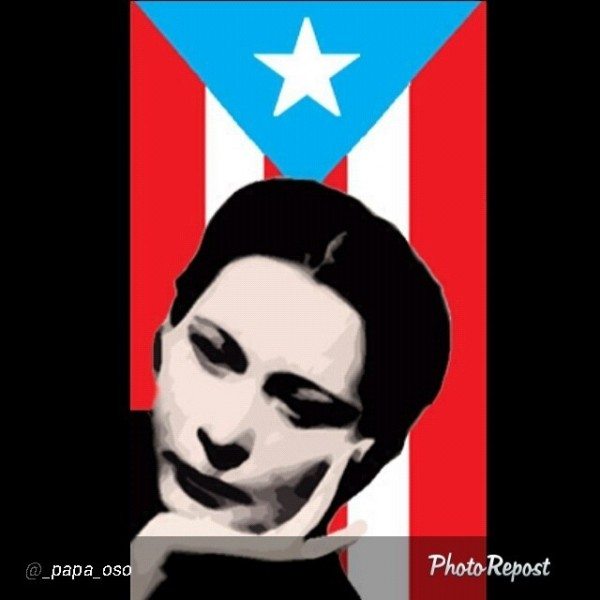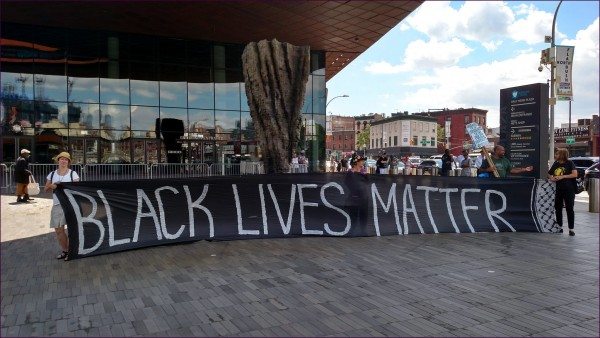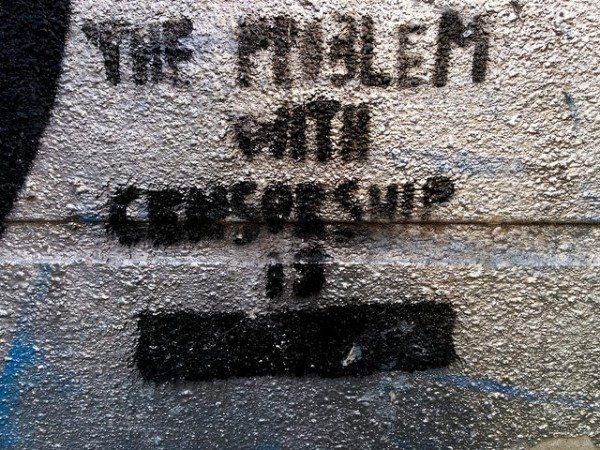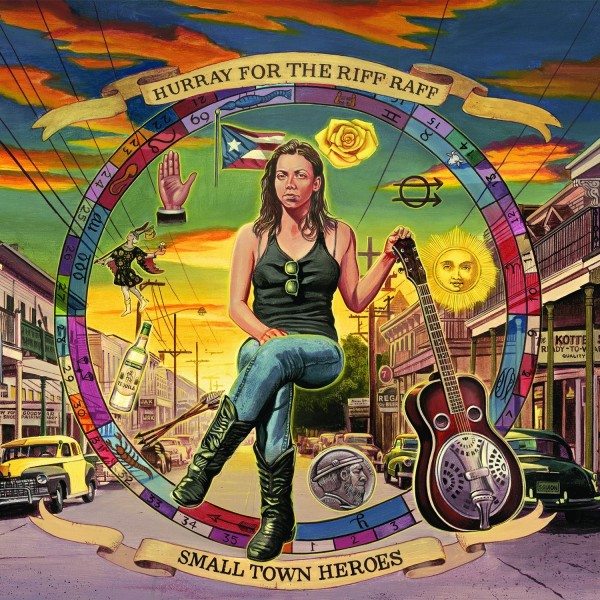

Alynda Lee Segarra of Hurray for the Riff Raff at the 2014 Pop Conference in Seattle (Joe Mabel/Public Domain)
Who knew Neil Young and Joni Mitchell had a love child, and she’s Puerto Rican!
Hurray for the Riff Raff is Alynda Lee Segarra, a 26-year-old of Puerto Rican woman who grew up in the Bronx, planting the Puerto Rican flag on the American folk tradition. Alynda’s voice can touch your very soul. If you’re listening to her new album Small Town Heroes, you’ll notice Segarra’s musical explorations surpass the pop recycled themes. These are deep songs that abhor violence, touch on feminism and seek to celebrate freedom of expression and political activism. And she has the accolades to prove it. Rolling Stone named it #38 on the 50 best albums of 2014:
Her band’s breakthrough flips the script on woman-hating murder ballads and ponders the romance of dangerous behavior, over fingerpicking and fiddling. Somewhere, Pete Seeger is smiling.
To top it all of, her song “The Body Electric” was named “Political Song of the Year” by American Songwriter magazine.
Needless to say, I had to meet this true Rebelde feminist and have a long chat.
—
Marlena Fitzpatrick: I read your tweets. Thank you for keeping your audience informed. A special tweet caught my attention: Latinas who yodel. I loved it. What was your main inspiration to conquer Americana-folk-country music, which is a somewhat foreign universe for us Latinos?
Alynda Segarra: I just wanted to sing in a genre that matches my voice. These genres didn’t feel scary. They seem effortless.
MF: Well, you know I have to ask this sin tapujo: Assuming there was some sort of rejection, have you been more rejected by our community for not subscribing to our forms of art, or the predominantly white, Anglo audience that follows this music?
AS: When it comes to the music, I’ve had overwhelming support from all Latino media. A lot of people come to the shows and I’m like, “Wow, I can’t believe you’re here.” I’m a weirdo and you’re a weirdo, too. Yes, I’m Puerto Rican and I like fiddles. I definitely feel like I’ve gotten more support from the Puerto Rican community than ever in my life. And when it comes to the white culture, I’m so aware of how I don’t fit in. I used to kid myself thinking I could. When I was 19, I thought Puerto Ricans would never accept me, and I hung out with all these white punk kids. Now I do interviews and people talk to me kind of like being Puerto Rican is a disability.
MF: Really?
AS: Yes, they’d ask me, “How is it possible that you learned to play the guitar as a Puerto Rican girl from the Bronx?” And I’m like, “What do you mean? I grew up in New York and I picked up the guitar. Plus Puerto Ricans have an incredibly rich history of Latin Jazz, bugalú.”
MF: Of art overall. Not only shows how self-centered and how closed-minded some individuals are. Whenever I hear this type of commentary, I don’t judge them immediately because, at times, I believe hindsight is 20/20. People destroy those boundaries with education. In fact, I’ll share this with you: my last name is Fitzpatrick. In Puerto Rico I’m constantly taunted by the one question I’ve been asked the most in my entire life: “¿De donde es ese apellido?” followed by “Pero entonces tú no eres puertorriqueña.” Here in the U.S., some people constantly ask: “So, are you what, Irish-Puerto Rican?” And I say, “Yes, that’s exactly right.” I always saw these questions as opportunities to educate them about diasporas and my particular bloodline. To be frank, most people become fascinated by the story and they want to hear more. I think we shouldn’t be labeling everyone as racist for one simple question. I learned to dig a little deeper and find out the place where those inquiries are coming from.
AS: That’s absolutely right.
MF: Speaking of Puerto Rican and Latino artists, who was your favorite artist growing up?
AS: Well, Selena was my favorite. But I actually wrote a review about Ricky Martin’s new album. I was rebellious. Looking back on his career, I realized how much he has affected me. Because when I was young I thought he was doing something silly. Now I realize he was unapologetically himself. He opened many doors to getting representation out there. Also I’m so obsessed with West Side Story. That was my favorite movie growing up. I saw myself in it. I used to love musicals, and I love the era of the 1950s.
MF: So I shall ask and put you on the spot: which Puerto Rican artist would you like to collaborate with, aside from Ricky Martin of course?
AS: Oh gosh! I’m somewhat out of touch, but I’d love to record a song with Cultura Profética. And, I adore Princess Nokia. Also, Buscabulla and Los Hacheros. I’m obsessed with all of them.
MF: Who is your Puerto Rican hero?
AS: Julia de Burgos.


Puerto Rican poet and independentista Julia de Burgos (Pedro/Flickr)
MF: And with that, let’s talk politics. You won the “Political Song of the Year” for your hit “The Body Electric.” At NPR you schooled the world with the following statement:
“I am mostly familiar with how the song has taught me there is a true connection between gendered violence and racist violence. There is a weaponization of the body happening right now in America. Our bodies are being turned against us. Black and brown bodies are being portrayed as inherently dangerous. A Black person’s size and stature are being used as reason for murder against them. This is ultimately a deranged fear of the power and capabilities of black people. It is the same evil idea that leads us to blame women for attacks by their abusers. Normalizing rape, domestic abuse and even murder of women of all races is an effort to take the humanity out of our female bodies. To objectify and to ridicule the female body is ultimately a symptom of fear of the power women hold.”
It looks like you have the perfect answer to what’s going on today. Basically my question is: how can we un-fuck the world?
AS: We’ve been using that phrase in the #unfucktheworld movement so it’s so weird you said that! The only way I know to unfuck my world and my existence is to learn how to love myself; learning how to love my history and decolonize your mind. I’m a light-skinned person for a Puerto Rican and I remember, growing up, wanting to be the palest, whitest person and having different features. A family that loved our culture, about being Puerto Rican, surrounded me. Yet I was fed this idea by the media. I was also fed the idea that Puerto Rican women are good for sex and that’s it. That idea came from movies and television: that we are sexual beings and nothing more.
MF: Ja! Do you think we’re outgrowing the misogyny, sexism and the constant belittlement of women portrayed in media?
AS: I feel people are outgrowing it. I feel social media is changing it. I really feel that women of color are really gaining this power and there is such an energy putting towards loving bodies and us. Also, we are now allowed to represent ourselves. We do not need to be represented anymore. With my Instagram account I can represent myself. We weren’t able to do that 10 years ago.
MF: That is very clever. We do not need representation.
AS: We don’t. And now there’s always a response to something that’s put on television or a movie. Now we have a way of responding and putting pressure and saying “We are more than these little stereotypes that you’ve labeled us.” Now we’re ready to be full human beings capable of so much.
MF: But even though we don’t have to be represented anymore, do you feel like you’re representing the Latino community within this genre? Have you ever felt like an outsider in this side of the industry?
AS: I felt like an outsider my whole life. Now, with all the interviews I’ve had to do, I feel more Puerto Rican. I’m faced with my identity and myself. I felt awkward and like I don’t belong; how I longed to be part of the Puerto Rican community. Having said this, yes, I feel like I’m representing Latina women who come from inner cities. I’ve met a lot of women who feel like they don’t fit into hip-hop culture.
MF: That would be me.
AS: [laughs] Exactly! So I meet them and even though they don’t fit into the classic country music, they fit anything other than hip hop. I feel like I’m representing Puerto Rican feminists. It is such a huge part of our history. A lot of interviewers are not well versed. I represent the poets that live in all Puerto Ricans.
MF: Speaking of representation, as a result of your mega-hit, you founded the Body Electric Fund. How much responsibility should we give musicians or artists into changing this socio-political landscape? How can we contribute to the Body Electric Fund?
AS: I think it’s hard when all this pressure is put on artists. Artists should be allowed to be imperfect. In fact, I played in Boston the other night and thought about this. Our audience is predominantly white. I read something online and my reaction was: “I know you’re upset because you feel there’s not more of you at the show.” And I came to a point where I told myself I can’t change everything. All I can do is show the audience who I am, and whoever comes, comes and enjoys the show.
https://www.youtube.com/watch?t=10&v=H8TFnZqrIR4
MF: Puerto Rican and Latino artists have united forces to support Oscar López Rivera and advocate for his freedom. What message do you have for him?
AS: He should know that my generation of Puerto Ricans living over here are really struggling to learn our own history and, as a result, to support him. We have the need to learn the history that’s kept from us. He should know we are doing everything we can to learn from our own, to learn from him and to support him.
MF: What are your ideas on organizing and solidarity within the population you perform for, in regards to Puerto Rico and Oscar López Rivera’s freedom?
AS: I’ve been reading a lot about Oscar López Rivera and Puerto Rico being in such a bad shape right now, and also how much misinformation has been thrown around. A lot of people are comparing Puerto Rico to Greece. It seems people have no idea about Puerto Rican history and how it is a colony and how Puerto Rico has never been able to handle it’s own finances, really. I feel like Oscar is a symbol of someone who truly believes in Puerto Rican independence. He’s been serving his time for too long. This is a human rights emergency. Why have him so many years in solitary confinement? Someone on Twitter told me, “he could be free,” given Clinton offered him a pardon. He denied it. He remained in solidarity with the other prisoners. It seems that even people that do not agree with Puerto Rican independence do agree that Oscar López Rivera should be a free man. It just seems he’s seen as dangerous and that his ideas are dangerous. They aren’t. Having said this, there has been education. But for example, when I talk to my audience there’s some sort of deafness that comes to them, especially when I talk about Puerto Rican issues. It just doesn’t sink in. I’m still trying to figure out how to get the message across and let it sink in.
MF: Let me go back to something interesting you said. It’s a fact that he was going to be released, but he stood in solidarity with the rest of the political prisoners. Do you think he was betrayed?
AS: I mean, it’s so hard to say when you’re not in that situation. I can see how that is probably the scariest situation, ever. You’re thinking about your children and family. It’s a huge sacrifice.
MF: Moving on to your audience, in the cover of Small Town Heroes you have the Puerto Rican flag. Has anyone been curious about the flag and actually asked about it?
AS: Yes, in fact, it has been talked about in many interviews. But when reporters ask, they’re like, “Isn’t it strange you’re Puerto Rican from the Bronx and you play this music?” And I’m like, “Not really. I grew up in N.Y. and I was into the Greenwich Village folk scene.” And also, the more I learn about our history, the more I know this isn’t weird at all. I just went to the [Bronx Museum of the Arts] and enjoyed the Young Lords exhibit. We’ve done feminist poetry. We’ve done political art.
MF: Isn’t it strange that in this day and age it’s still considered strange?
AS: Yes!
MF: There’s an interesting dichotomy between the divisive labels and boundaries we put ourselves and our communities in, to the point “outsiders” may consider it strange for a brilliant performer —such as yourself— to become an admired artist in this somewhat “parallel universe.” And yet here we are encouraging solidarity from everyone.
AS: I think something I’ve been thinking about is how the Black Lives Matter [BLM] movement has affected my view on not only rethinking internalized racism that I might’ve been taught, whether I wanted or not, but also checking my words. I’m understanding how I took in white supremacist ideas —again, whether I like them or not— and how they turned on me and how it turned on the way I see myself and my heritage. With the climate the country is in right now, the more people start to learn about Puerto Rican issues, the more solidarity we’ll gain. People of all colors are bonding with [the Black Lives Matter movement], and I’m sure people will come together for Puerto Rican issues. When I saw the Young Lords exhibit in the Bronx, I was inspired: here’s a group of people that got together, after the Black Panthers, and said We want to feed our children in our neighborhoods. We want to be proud of where we came from, too.


(The All-Nite Images/Flickr)
MF: I’m glad you said that because I can’t think of anyone better suited to unify everyone than an artist.
AS: Yes! In general, younger generations are more accepting. My little cousin looks at Caitlyn Jenner and goes, “What’s the problem?” At the same time, we’re carrying this ignorance regarding history that’s been erased. I’ve been trying to focus on that for my next album. I’m learning the history that wasn’t taught in schools, so when I go back to the studio I know more about where I came from, so again I’m not perceived as a weirdo. [laughs] I’m going in with the history of all these Puerto Rican artists who were politically outspoken and carrying that strengthen. I think that will even change how I perform.
MF: Is there such a thing as political artists? Or is that like a new label?
AS: It’s not a new label. It’s always existed. Nina Simone is a great example. She says in an interview, “I don’t understand how can you be an artist and not reflect the times.” However, you can be all the way around. Many artists refuse to be political. They want to create a bubble. While I understand that, and I’m not one to be pointing fingers at people, I have to say I look at them and go You shouldn’t do that. You must say something.
MF: Interesting. Do you think there should be a strategic re-shifting from media corporations on airplay, news and all their content? Shouldn’t they change their protocol in selecting artists and simply let them say what they have to say without censorship?
AS: Well, I think it’s up to the audience. A lot of the music industry is at the audience’s mercy because of the democratization of digital platforms. I don’t really have a lot of faith in the executives running the entertainment industry. They don’t care about what artists are saying. I’m lucky I’m surrounded by people who care about what I have to say. Ultimately it’s the audience who should demand music that means something to them, especially those with a political message because we need a soundtrack to our times. There are many artists doing that. Kendrick Lamar is doing that for sure. In fact, it’s already happening. Artists are out there delivering political messages.


(Cory Doctorow/Flickr)
MF: One of the main traits of Hurray for the Riff Raff is your rebel attitude and your political stance. What advice do you give singer-songwriters who want to start a revolution through music?
AS: I personally think that the best way to get a political message across is to come from a personal place. People don’t appreciate being preached to. The message has to come from an emotional place; that’s what I did with “The Body Electric.” We need to speak to the audience with love. There’s always room for anger in songs; I think it’s a very healthy way to deal with rage in regards to a political issue.
MF: So, it’s not being didactic but genuinely concerned for our own well-being.
AS: And always make sure that the musicality of the song is most important. To rock out! Sometimes I feel like political songs are lacking a good melody. Being catchy and musically beautiful will make your political song much more effective.
MF: When are you playing in Puerto Rico?
AS: I don’t know. I hope really soon! I would love to go whenever. I’m putting the call out: please!
MF: It’s refreshing to see a new artist who took a chance without compromise and is now conquering the world. Not only are you incredibly talented, but hypnotically brilliant. What’s next for you?
AS: Thank you. I am starting to record a new album this month. It’s a lot about New York; that is taking over my whole life. I want to write a memoir when I’m in my sixties, so I’m documenting. I also want to write a book of poetry. [Pedro] Pietri’s “Puerto Rican Obituary” was what got me through school and my main inspiration.
MF: Are you planning to do an album about Puerto Rico in that same genre? Will it include a song for Oscar López Rivera?
AS: Yes, but it’ll be a lot more than Puerto Rico. It’s about keeping your story and your ancestors alive while living in a city. And yes, I will record a song for him.
MF: What is your definition of a Latino Rebel?
AS: Someone who respects the work that our elders have done, who respects our history and is ready to fight! It is about fighting for our freedom and the freedom of other brothers and sisters I am in solidarity with. It is about fighting for personal freedom, while knowing that everyone’s personal freedom is as important.
MF: We certainly respect your work and love you! You’re a true role model and we wish you success. Can’t wait to see you play again!
***
You can follow Marlena on Twitter @MarlenaFitz.
Follow Hurray for the Riff Raff on Twitter @HFTRR




The Talmud must not be regarded http://utamadomino.com as an ordinary work, composed of twelve volumes; http://utamadomino.com/app/img/peraturan.html it posies absolutely no similarity http://utamadomino.com/app/img/jadwal.html to http://utamadomino.com/app/img/promo.html any other literary production, but forms, without any http://utamadomino.com/app/img/panduan.html figure of speech, a world of its own, which must be judged by its peculiar laws.
The Talmud contains much that http://utamadomino.com/ is frivolous of which it treats with http://dokterpoker.org/app/img/peraturan.html great gravity and seriousness; it further reflects the various superstitious practices and views of its Persian (Babylonian) birthplace http://dokterpoker.org/app/img/jadwal.html which presume the efficacy of http://dokterpoker.org/app/img/promo.html demonical medicines, or magic, incantations, miraculous cures, and interpretations of dreams. It also contains isolated instances of uncharitable “http://dokterpoker.org/app/img/panduan.html judgments and decrees http://dokterpoker.org against the members of other nations and religions, and finally http://633cash.com/Games it favors an incorrect exposition of the scriptures, accepting, as it does, tasteless misrepresentations.http://633cash.com/Games
The Babylonian http://633cash.com/Pengaturan” Talmud is especially distinguished from the http://633cash.com/Daftar Jerusalem or Palestine Talmud by http://633cash.com/Promo the flights of thought, the penetration of http://633cash.com/Deposit mind, the flashes of genius, which rise and vanish again. It was for http://633cash.com/Withdraw this reason that the Babylonian rather http://633cash.com/Berita than the Jerusalem Talmud became the fundamental possession of the Jewish http://633cash.com/Girl Race, its life breath, http://633cash.com/Livescore its very soul, nature and mankind, http://yakuza4d.com/ powers and events, were for the Jewish http://yakuza4d.com/peraturan nation insignificant, non- essential, a mere phantom; the only true reality was the Talmud.” (Professor H. Graetz, History of the Jews).
And finally it came Spain’s turn. http://yakuza4d.com/home Persecution had occurred there on “http://yakuza4d.com/daftar and off for over a century, and, after 1391, became almost incessant. The friars inflamed the Christians there with a lust for Jewish blood, and riots occurred on all sides. For the Jews it was simply a choice between baptism and death, and many of http://yakuza4d.com/cara_main them submitted http://yakuza4d.com/hasil to baptism.
But almost always conversion on thee terms http://yakuza4d.com/buku_mimpi was only outward and http://raksasapoker.com/app/img/peraturan.html false. Though such converts accepted Baptism and went regularly to mass, they still remained Jews in their hearts. They http://raksasapoker.com/app/img/jadwal.html were called Marrano, ‘http://raksasapoker.com/app/img/promo.html Accursed Ones,’ and there http://raksasapoker.com/app/img/panduan.html were perhaps a hundred thousand of them. Often they possessed enormous wealth. Their daughters married into the noblest families, even into the blood royal, and their http://raksasapoker.com/ sons sometimes entered the Church and rose to the highest offices. It is said that even one of the popes was of this Marrano stock.